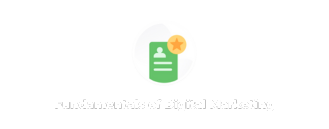Different Types of Search Intent: Informational, Navigational, & Transactional
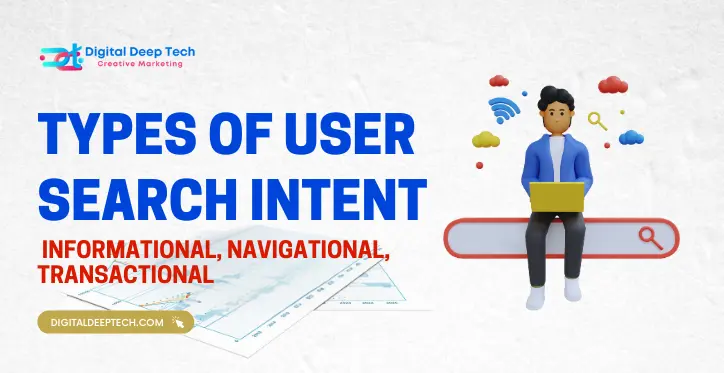
Table of the content
Introduction
Digital marketing for search-and any form of successful SEO-is all about understanding the search intent. It remains the core basis of any SEO strategy. You are optimizing a blog post, creating a landing page, or crafting an overarching content plan when you neglect to consider what underlies a user’s search-and that is costing you invaluable traffic, leads, and conversions.
But what is search intent SEO? Basically, it is the optimization of content for what a person looks for. Whether it is to inform a searcher or merely to get a person to a certain website or even to buy, identifying and catering to these different versions in search intents would increase your chances of ranking high in Google and capturing qualified traffic tenfold.
This is going to be a long guide, so I am going to walk you through exactly how to optimize for the three main types of search intent in turn-informational, navigational, and transactional – and then tell you how each affects your SEO strategy.
Day 11 of the Free SEO Course
Learn advanced strategies, then reach out to get online training to take your skills to the next level!
Why Are We Ignoring Search Intent?
All these organizations end up blowing money on SEO methods, which end up being useless, only because of the wrong focus on what people want to find. Thus, many efforts will become useless with useless results.
You may get ranked for high-volume keywords, but if your content does not meet what a user is looking for, then your efforts turn useless.
That means if someone is looking for “how to fix the leaky roof, but the website is selling the services of installing or repairing a roof. The customer still isn’t ready to buy; he wants to know about the repair process.
Because he is not getting what he has been looking for, he leaves your website very quickly and thus brings about a high bounce rate and low engagement at the same time. This not only impacts your conversion but also implies to Google that the content you have is irrelevant, thus bringing down your rankings.
Well, having the years of experience of working with SEO services for small businesses in a rather diverse industry such as roofing, finance, and insurance, I can really say that most companies that have a good strategy in terms of SEO have one common mistake that has been committed – they failed to focus on search intent.
Consequences of Not Considering Search Intent
Ignorance towards such factors as search intent will lead to many adverse consequences for your website’s performance:
- Higher Bounce Rates: Users leave your website straight away if the content does not align with their intent, telling Google that your website is not relevant.
- Lower Engagement Rates: Without actual alignment to intent, users will not engage with your content, and this reduces clicks, conversions, and signups.
- Lost Sales: If you do not capture transactional search intent-the very point when users become ready to buy-you will miss out on the dollar value.
- Reduced Rankings: Google’s user experience algorithms are a safe bet to rank lower on other search engine result pages. The contents that are not aligned to the intent of user search will rank lower.
For example, consider a small roofing business in Sydney; they were ranking for high-volume roofing-related terms but were not generating the right leads. Analyzing their site, I found that their content didn’t focus on user intent-that is, informational searches about roof maintenance were being met with an aggressive sale pitch. I restaged the content approach on the right intent, and within two months, the company saw a 30 percent spike in traffic with higher conversions.
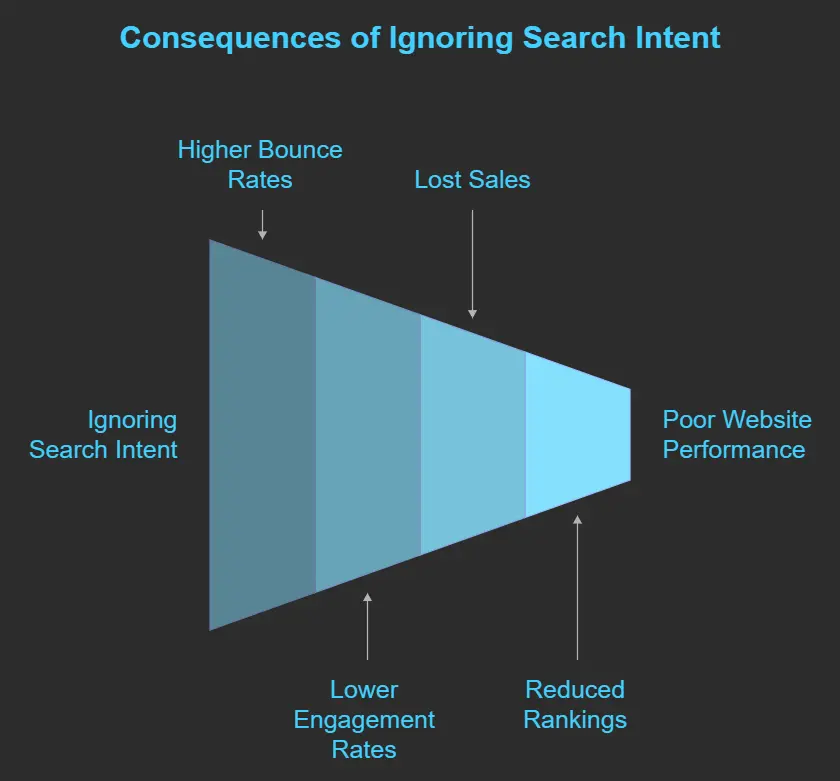
Custom Content to Fit the Different Types of Search Intention
To be successful at SEO, your content needs to match up with all the other types of search intention. Let’s go through them all and discuss options to optimize for each one:
1. Informational Search Intention
Definition: The person intends to find information or needs to obtain the answer to something. At this moment in time, they do not intend to buy something but are conducting exploratory research.
Example: “How to optimize a website for mobile,” “What is SEO?”
SEO Strategy: Create content in the form of blog posts, guides, and how-to articles which answers these questions. Use keywords such as “how”, “what or” why” to catch all these searches. Business owners who want to instill trust and project themselves to be an authority in their respective niche have to address informational intent. It will make educating your potential customers and mean them more likely to go to you when they need information.
Practical Example: A local plumbing company client instantly gained traffic when they published a series of blog posts that answered questions regarding common plumbing issues. They weren’t selling per se on the front end but by providing value, leads were generated from those users when those users were ready for a pro plumber to come in.
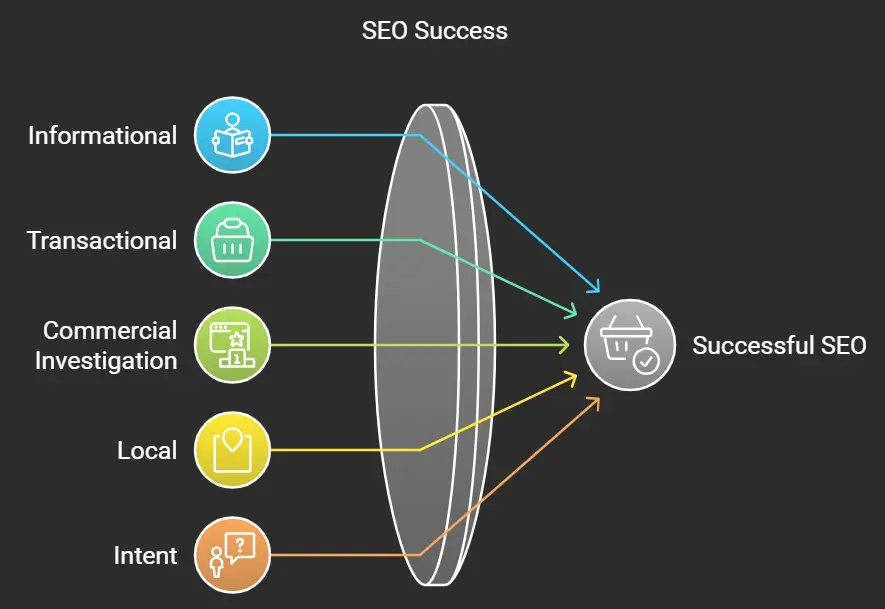
2. Informational Search Intent
Definition: Users are seeking information or do not know what they want.
Examples: “Facebook login,” “Digital Deep Tech.”
Optimization Strategy: Make sure that your main pages such as your contact page, service pages, or blog posts are readily available on your website. Optimize your Google My Business profile for local search so that you’ll be able to capture navigational intent searches.
Real-Time Example: I have optimized my personal website, so if anybody is typesetting “Deepak Sharma SEO expert,” my homepage comes up as the first result, hence it provides them easy access to my services and contact information.
3. Transactional Search Intent
Definition: The user is ready to buy or to take an action. They want to book a service, register for a course or buy something.
Examples: “Buy SEO services online, Hire a digital marketing firm.”
Optimization Strategy: Conversion intent- This is the place where you want to optimize clear calls-to-action (CTA’s), and product pages as well as service landing pages. Make it as easy to convert as possible for the user by using appropriate content, including pricing, testimonials, and hard-hitting CTA’s.
Practical Example: We improved the product pages for one of our clients, an e-commerce company pointed directly at transactional searches queries. We added CTAs including “Buy Now” and streamlined checkout; this resulted in an increase in conversion rates.
4. Commercial Investigation Intent
Definition: Users are browsing through their choices before making an end purchase decision. They are not in a buying mood but possibly doing this in order to work their options.
Examples: “Best digital marketing agencies in Sydney,” “Best SEO tools.”
Optimization Strategy: Comparison articles, case studies and product reviews. Value of such content should be to the user by assisting them in informed decision-making and not too promotional.
Real-Life Example: I was working with a client who was in financial services, and they wanted to rank for commercial investigation search queries, such as “best financial advisors in Sydney.” We created more detailed comparison content and case studies that spoke to their services and ended up being specialists in the niche. This resulted in higher-quality leads and better engagement.
5. Local Search Intent
Definition: The users are searching for services or products in a specific location.
Examples: “Roofing contractors near me,” “Best SEO services in Parramatta.”
Optimization Strategy: Capture local search intent using local SEO of your website, using location- based keywords, keeping the Google My Business profile updated, and ensuring NAP: name, address, phone number information put up on your website.
Very important to businesses that create a lot of foot traffic, businesses that require local service, and others relying on driving foot traffic into the business. Local search intent optimization helps attract more qualified leads who are better prepared to engage with your business.
Finding and Monitoring Search Intent
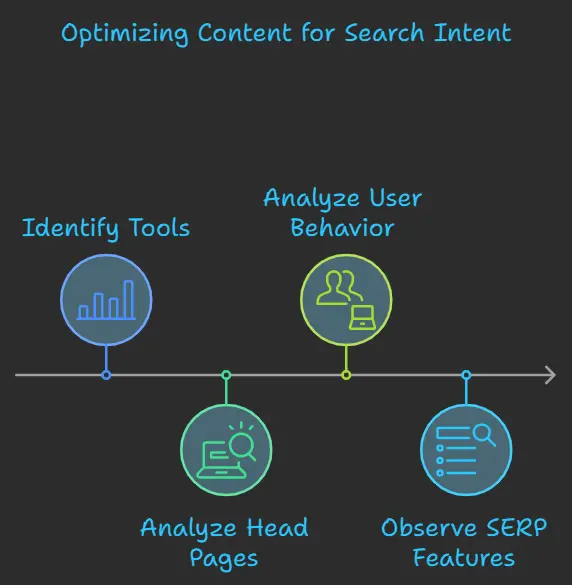
Keywords in search intent are always evolving. Finding and optimizing your content for these keywords is an ongoing process. Here’s how you can do it:
- Tools: Use Ahrefs, SEMrush, or Google Analytics to track your search queries and what they intend to say.
- Analyze the head pages for those target keywords. If it’s a blog post maybe an informational query. If you see product pages or shopping ads then this would be a transactional query.
- Analyze the User Behavior: Utilize Google Analytics to track the user behavior in your site. If you notice a much higher bounce rate on particular pages, then that means the content isn’t relevant enough for the search intent for which they actually came.
- SERP Features: You will now get those special features on SERPs like “People Also Ask” boxes or shopping ads. These help identify if it’s an informational or transactional kind of query.
Let's Discuss Your Project
Get a free one-week consultation and share your vision for digital marketing with us.
Key Terms You Need to Know
Introduction to the key terms: Understanding search intent mandates
Search Intent SEO: the practice of optimizing your content based on the intent behind the searches that come through.
Keyword Search Intent: How the users wish to find answers to the keywords they type in a search engine.
Examples of Search Intent: The “buy roofing materials” query would be a transactional example, while “how do I fix a leaky roof” would be informational.
Ahrefs Search Intent: Is a tool to understand keyword intent for more optimally better content.
Master these concepts and help you be equipped in building just the right kind of content strategy, one that delivers exactly what users need when they need it.
Conclusion
Ultimately, a good SEO strategy depends heavily on the knowledge of what search intent is. If the user looks for information, compares options or is ready to buy something, then such a content must meet the user’s requirements.
Writing with the intention to match a user’s intent has better engagement and conversion rates, and better ranks. With such fierce competition in the current digital marketplace, the ability to expertly handle search intent is no longer a choice; it is a requirement for businesses competing in this space.
If you are on the plan to take your SEO to the next level and meet your customers’ needs properly, I’m here for you. Reach out to Digital Deep Tech; let’s drive into the strategy based on search intent, and the results will come to you!
Frequently Asked Questions (FAQs)
Q1: What is search intent in SEO?
Search intent is the intent of a user’s query, showing whether they’re searching for information, looking for navigation, or looking to purchase.
Q2: How do I identify search intent?
Employ such tools as Ahrefs to go through the keywords for which users are searching. See whether they contain words such as “how to” or “buy.”
Q3: What are the four types of search intent?
There are four major kinds: informational, navigational, transactional, and commercial investigation.
Q4: What tools would you recommend for keyword difficulty analysis?
Among the most effective tools in keyword difficulty analysis are Ahrefs, Moz, and SEMRush. Each of these has some unique insight, hence a more holistic analysis would be required by using more than one of them.
Q5: How does search intent affect SEO?
When you align your content with the search intent, your rankings and bounce rates become better, and more conversions are achieved.
Q6: What is informational search intent?
The user wants to find an answer to a question or get knowledge on a topic.
Q7: What is transactional search intent?
The user intends to buy or make a transaction.
Q8:How do I optimize for search intent?
Identify what the user is trying to do with the keyword and immediately create content to fulfill that need.
Q9: What tools would track search intent?
Ahrefs, SEMrush, and even Google Analytics can help you determine which way the needle is pointing.
Q10: Why is understanding search intent important for local SEO?
With local search intent, you’re focusing on those users who are already prepared to hire your service in a particular location.

About the Author
Deepak Sharma is the founder of Digital Deep Tech and a renowned SEO and digital marketing expert with over a decade of experience. Passionate about helping businesses enhance their online presence, Deepak specializes in creating SEO strategies that drive traffic and generate leads.




